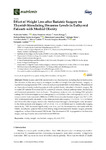Effect of weight loss after bariatric surgery on thyroid-stimulating hormone levels in euthyroid patients with morbid obesity

Ver/
Use este enlace para citar
http://hdl.handle.net/2183/23374
A non ser que se indique outra cousa, a licenza do ítem descríbese como Creative Commons Attribution 4.0 International License (CC-BY 4.0)
Coleccións
- Investigación (FCS) [1293]
Metadatos
Mostrar o rexistro completo do ítemTítulo
Effect of weight loss after bariatric surgery on thyroid-stimulating hormone levels in euthyroid patients with morbid obesityAutor(es)
Data
2019-05-20Cita bibliográfica
Juiz-Valiña P, Outeiriño-Blanco E, Pértega S, Varela-Rodriguez BM, García-Brao MJ, Mena E, Pena-Bello L, Cordido M, Sangiao-Alvarellos S, Cordido F. Effect of weight loss after bariatric surgery on thyroid-stimulating hormone levels in euthyroid patients with morbid obesity. Nutrients. 2019 May 20;11(5):1121.
Resumo
[Abstract] Obesity is associated with several endocrine abnormalities, including thyroid dysfunction. The objective of this study was to investigate the effect of weight loss after bariatric surgery on thyroid-stimulating hormone (TSH) levels in euthyroid patients with morbid obesity. We performed an observational study, evaluating patients with morbid obesity submitted to bariatric surgery. We included 129 patients (92 women) and 31 controls (21 women). Clinical, anthropometric, biochemical, and hormonal parameters were evaluated. The primary endpoint was circulating TSH (µU/mL). Fasting TSH levels were higher in the obese group (3.3 ± 0.2) than in the control group (2.1 ± 0.2). The mean excessive body mass index (BMI) loss (EBMIL) 12 months after bariatric surgery was 72.7 ± 2.1%. TSH levels significantly decreased in the obese patients after surgery; 3.3 ± 0.2 vs. 2.1 ± 0.2 before and 12 months after surgery, respectively. Free thyroxine (T4) (ng/dL) levels significantly decreased in the obese patients after surgery; 1.47 ± 0.02 vs. 1.12 ± 0.02 before and 12 months after surgery, respectively. TSH decreased significantly over time, and the decrement was associated with the EBMIL. In euthyroid patients with morbid obesity, weight loss induced by bariatric surgery promotes a significant decline of the increased TSH levels. This decrement of TSH is progressive over time after surgery and significantly associated with excess BMI loss.
Palabras chave
Obesity
Weight loss
Bariatric surgery
Thyroid
TSH
Weight loss
Bariatric surgery
Thyroid
TSH
Versión do editor
Dereitos
Creative Commons Attribution 4.0 International License (CC-BY 4.0)
ISSN
2072-6643






